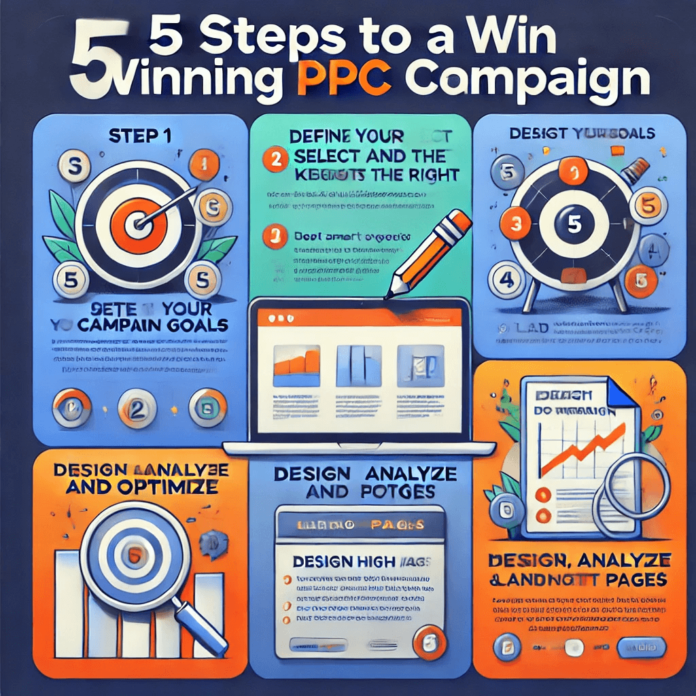Introduction
Looking to boost your digital marketing success? Learning how to create a PPC campaign is essential for driving traffic, generating leads, and maximizing ROI. This comprehensive PPC campaign guide walks you through five simple steps to set up a winning campaign. By following these winning PPC strategies, you’ll not only reach your target audience but also achieve measurable results. From setting clear goals to optimizing performance, this guide covers everything you need to build a high-performing PPC campaign. Let’s get started!
A well-executed Pay-Per-Click (PPC) campaign can transform your digital marketing efforts, driving targeted traffic, generating quality leads, and boosting sales. However creating a successful PPC campaign requires more than just placing ads—it demands strategic planning and ongoing optimization. This guide breaks down the process into 5 easy steps to help you craft a winning PPC campaign, whether you’re a beginner or looking to enhance your current strategy.
How to Create a PPC Campaign That Delivers Results

Creating a PPC campaign requires strategic planning to ensure it effectively reaches your target audience and achieves your marketing objectives. Start by defining clear goals for your campaign—whether it’s driving traffic, generating leads, or increasing sales.
Next, focus on keyword research to identify the terms your audience is searching for. Use tools like Google Keyword Planner to find high-performing keywords and include negative keywords to filter out irrelevant traffic.
Finally, design compelling ad copy paired with optimized landing pages. This ensures that when users click, they find exactly what they’re looking for, increasing your conversion rates and maximizing ROI.
Define Your Campaign Goals
Defining clear objectives is a crucial first step before launching any PPC campaign. Without clear goals, you won’t be able to measure success or allocate your budget effectively.
Why Setting Clear Goals Matters
Your PPC strategy should align with your overall business objectives. For instance:
- If you want more website visitors, your goal might focus on increasing click-through rates (CTR).
- For lead generation, the objective could be boosting form submissions or inquiries.
- E-commerce businesses may aim to increase sales by a specific percentage.
How to Set SMART Goals
A clear, actionable goal might be:
- Achieve a 20% increase in online sales within three months by targeting high-converting keywords on Google Ads.
- SMART goals ensure that your campaign has a defined direction and measurable outcomes.
Research and Select the Right Keywords
Keywords are the backbone of a PPC campaign. They determine where your ads appear and who sees them.
The Role of Keywords in PPC Success
Selecting the right keywords ensures your ads reach users who are actively searching for products or services like yours.
Tools for Effective Keyword Research
Leverage tools such as Google Keyword Planner, SEMrush, and Ahrefs to uncover high-traffic keywords with low to moderate competition. Don’t forget to analyze competitors’ keywords to uncover new opportunities.
Long-Tail Keywords and Negative Keywords
- Long-Tail Keywords: These are specific phrases with lower competition but high conversion potential, like “affordable SEO services for small businesses.”
- Negative Keywords: Eliminate unrelated terms to ensure your ad budget is spent effectively on relevant clicks.For instance, if you sell premium products, adding “cheap” as a negative keyword prevents unqualified clicks.
Craft Compelling Ad Copy
Your ad copy is the first impression users get of your business. Make it count!
Writing Ads That Attract and Convert
An effective ad includes:
- A headline that grabs attention (e.g., “Save 20% on Designer Furniture!”).
- A concise description that highlights benefits and features.
- A strong call-to-action (CTA) that encourages users to act (e.g., “Shop Now,” “Get a Free Quote”).
A/B Testing for Optimization
Test multiple versions of your ad to see which performs best. Monitor metrics like CTR and conversion rates to refine your approach.
Design High-Converting Landing Pages
Your landing page quality plays a critical role in influencing ad effectiveness and maximizing ROI.
Why Landing Pages Matter in PPC Campaigns
Landing pages that align with your ads improve your Quality Score, lowering costs and increasing ad rankings.
Features of a Great Landing Page
- Relevant Content: Ensure your landing page aligns seamlessly with the message and offer presented in your ad.
- Mobile-Friendly Design: Ensure pages are responsive and load quickly on all devices.
- Trust Signals: Include customer reviews, certifications, or guarantees to build confidence.
Monitor, Analyze, and Optimize
Launching your campaign is just the beginning. To achieve long-term success, continuous monitoring and optimization are essential.
Essential PPC Metrics to Track
Key metrics include:
- Click-Through Rate (CTR): Evaluate the effectiveness of your ad in capturing user interest and driving interaction.
- Conversion Rate: Indicates the percentage of clicks that lead to actions.
- Quality Score: A Google metric that evaluates ad relevance and landing page quality.
How to Optimize Your Campaign
- Adjust bids for high-performing keywords to maximize ROI.
- Pause underperforming ads and shift your budget to successful ones.
- Regularly review and refine your keywords and ad copy based on performance data.
Pro Tips for Maximizing PPC Success
- Leverage Retargeting: Reach users who previously visited your site to encourage conversions.
- Seasonal Campaigns: Adjust ads to reflect trends, holidays, or seasonal demand.
- Use Automation Tools: Platforms like Google Ads offer automated bidding and performance tracking to save time and enhance results.
Conclusion
Creating a successful PPC campaign doesn’t have to be complicated. By following these 5 easy steps—defining your goals, researching keywords, crafting compelling ads, designing effective landing pages, and optimizing your campaign—you can achieve measurable success and a strong return on investment. Ready to see results? Start building your winning PPC campaign today! Creating a successful PPC campaign involves a mix of strategic planning, effective execution, and continuous optimization. By following a structured approach—defining clear goals, conducting thorough keyword research, crafting compelling ad copy, and designing user-friendly landing pages—you can create a PPC campaign that delivers measurable results.
Don’t forget the importance of monitoring key metrics like CTR, conversion rates, and ROI. Regularly refine your campaigns to maximize performance and stay ahead of competitors. PPC campaigns offer unmatched opportunities to target specific audiences and drive immediate traffic, making them an essential part of any digital marketing strategy.














